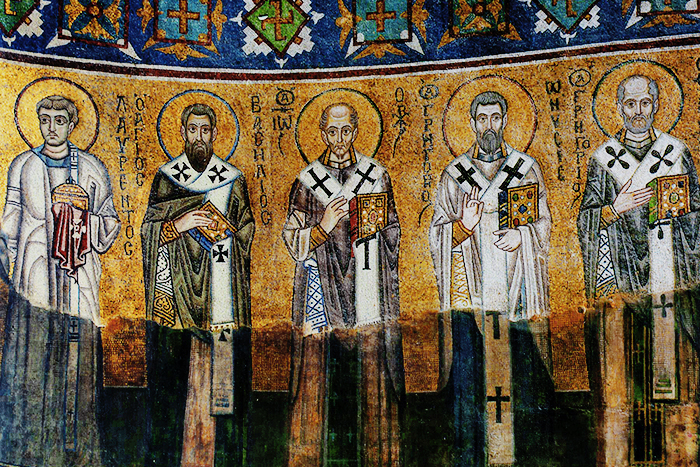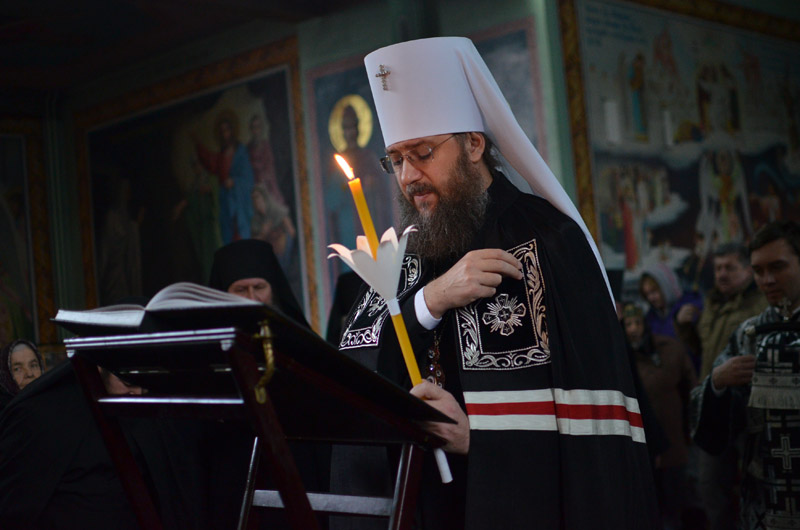
I am sure, for most of you, in your discussions and reading about Orthodox theology all of you have at one point or another come upon that podcast or article warning you not to be “too legalistic” when reading the Fathers. Similarly, there is bandied about this idea that one can “know theology” yet miss the point of the Gospel. At the center of these two statements is promoted this idea of a distinction between the intellect (nous) and the heart, with a desire to “keep theology in one’s heart” vs. being too overly intellectual. But does this harshly rigid distinction between intellect and heart exist?
In the exegesis of Psalm 145 (LXX), we discussed the symbolism behind Christ giving up His Spirit. There is a key sentence of this account in the Gospel of Luke which suits our discussion at hand: “Then the sun was darkened, and the veil of the temple was torn in two.” ~Luke 23:45
The symbolism is rather striking. The sun (light, brilliance, revelation, knowledge) is darkened at the crucifixion. We’re going to shelve this symbolism for now, but do not forget it, for we will come back to it at the end to tie everything together.
From the beginning, we must emphatically state that any and all persons who want to sentimentalize the faith, and make theology anywhere remotely sentimental, grossly misunderstand the Fathers and the Patristic usage of such terms intellect (nous) and heart. If by heart, those who say not to be “too legalistic” mean anything remotely emotional, a type of “emotionalism,” well, our only response can be that the Christian life is about achieving dispassion, which is, quite frankly, the opposite of our modern understanding of being “emotional”.
(Note: Please do not fall into the standard misconception of interpreting this Orthodox understanding of dispassion in terms of the English word “apathy” — that is completely misleading. Dispassion does not, in fact, mean to be “devoid of human feeling”, but instead to cease to be governed by all the warring emotions and feelings that run rampant within us, but rather to have those passible and highly mutable aspects of our inner life be placed into a transformative subjection to the rightly ordered spiritual intellect or nous, namely the mind that is unwaveringly obedient to Jesus Christ. With that in mind, let us continue.)

Conversely to the false “emotionalism”, and yet on the opposite side of the same coin, is a type of false “intellectualism,” a type of academic accumulation of mere data points, without perceiving the Gospel noetically. Our Lord mentions this, saying, “If you were blind, you would have no sin; but now you say, ‘We see.’ Therefore your sin remains.” (John 9:41) Here the Pharisees were not perceiving the words of our Lord noetically. They were unable to perceive their sin because they were not using their ‘intellect’ or ‘nous’ (ie the spiritual “eye” of the heart — the spiritual organ of “sight”) to see, but rather for some mere intellectualism.
So how are the terms intellect (nous) and heart (kardia) to be understood? How do the Fathers use these terms?
“The heart is the mystical and hidden chamber of the mind, or in other words, the soul, as we said in the beginning.” ~St Nicodemos of the Holy Mountain
St Nicodemos of the Holy Mountain was one of the two compilers of the Philokalia for the laity. Here, St Nicodemos relates the heart directly with the mind (i.e. the nous or intellect) and says that the heart is both mystical and hidden, (tuck that away on the same shelf where we put Christ being revealed in darkness). Like this saying by St Nicodemos, it is often said that “the nous is the eye of the soul.”
In his treatise on the heart, St Dimitri of Rostov not only talks of the heart in intimate proximity with the mind, but he also equates the two when he symbolically renders ‘praying in secret’ (Matt 6:6) as follows: “The closet is twofold, outer and inner, material and spiritual: the material place is of wood or stone, the spiritual closet is the heart or mind.” Like St Nicodemos above, St Dimitri here speaks of the heart as something distinct from that of any material place (namely, as a spiritual closet) and as something more in alignment with a hidden or mystical “place”.
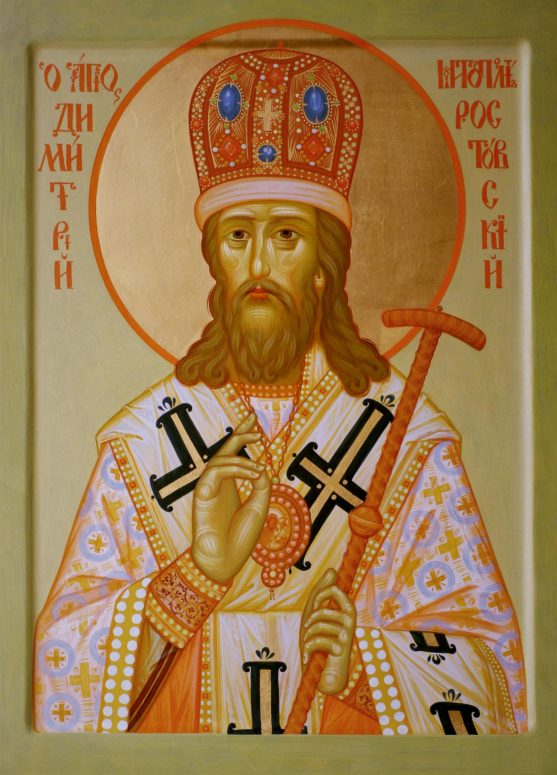
This all begs the question: how do we gain access to our heart? We gain access to the heart through our proper use of the “eye of the heart”, the intellect (the nous)! It is through the proper use of our intellectual or noetic faculty that we gain access to our heart, which is why the Fathers are constantly telling us to be noetically or mentally on guard — in order to protect our thoughts. For, we must train our intellect to be mindful, to be attentive. We must exercise intellectual watchfulness. Ss. Isaac the Syrian, Nicodemos the Holy Mountain, and Dimitri of Rostov, elucidate:
“A muddled intellect cannot avoid forgetfulness, and wisdom does not open her door before it.” St Isaac the Syrian, Homily 5 (Syriac reads: “A distracted heart cannot avoid going astray…”). I have included the translation from the Syriac (where it says “distracted heart”) alongside the translation from the Greek (where it says “muddled intellect”) to highlight just how intimately the monastic Orthodox Greek translators were able even, at times, to equate heart and intellect, with one other. Think here, also, of the words of King Solomon from the book of Proverbs in the Old Testament: “As a man thinketh in his heart, so is he.” (Proverbs 23:7) Thinking and the heart are not unrelated in the least.
This fact is rather common among the Syrian Fathers and is something to always keep in mind when reading St Isaac the Syrian. For, he can, while writing from within the Syriac tradition of expression, use the term “heart” in such a manner as to be found equivalent at that point to the concept found within the Greek tradition’s verbal usage of “nous” or “intellect”.
St Isaac, however, is never speaking of some emotional, sentimental “heart”. Rather, keeping in mind the words of St Nicodemos, St Isaac is perfectly aligned, speaking of the heart as the mystical center of Man. This also shows that it is utterly impossible to know theology and somehow miss the point of the Gospel, for wisdom does not open her door…before a muddled intellect (ie a distracted heart)!
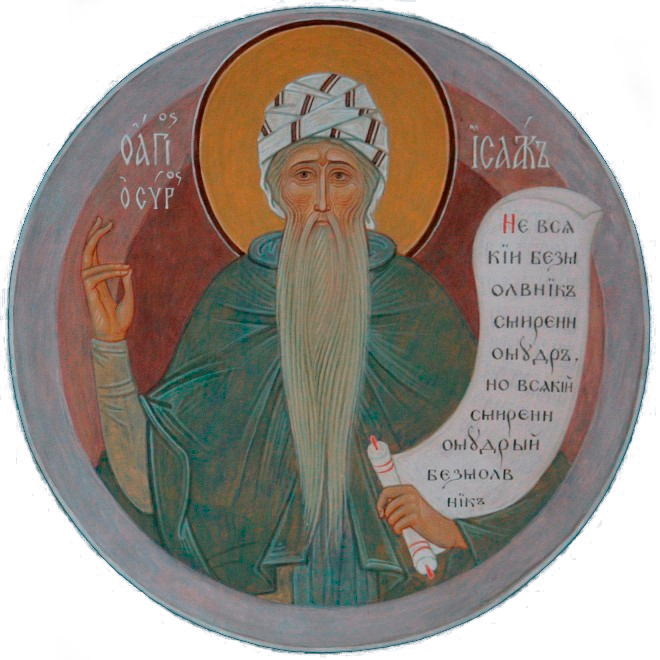
Later St Isaac continues with precisely how one properly arrays their intellect:
“Without non-possessiveness, the soul cannot be freed from the turmoil of thoughts; and without stillness of senses, she will not perceive peace of mind. Without entering into temptations, no man will ever gain the wisdom of the Spirit; and without assiduous reading, he will know no refinement of thoughts.” St Isaac the Syrian, Homily 5
Notice just how closely St. Isaac, above, relates to the concepts of soul, mind, wisdom, and thoughts, and how King Solomon has closely related the heart to one’s thinking, and, as we will now see in the next two quotations, how St. Nicodemos and St. Dimitri closely relate the heart with various thoughts that enter there or are collected there.
“One must be more vigilant to guard his heart from evil thoughts and passions than to guard his sense from external and harmful influences.” ~St Nicodemos of the Holy Mountain, Guarding the Mind and the Heart
“Training, then, must also be twofold, outer and inner: outer in reading books, inner in thoughts of God; outer in love of wisdom, inner in love of God; outer in words, inner in prayer; outer in keenness of intellect, inner in warmth of spirit; outer in technique, inner in vision…Wherever man is, his heart is always with him, and so, having collected his thoughts inside his heart [emphasis mine], he can shut himself in and pray to God in secret, whether he be talking or listening, whether among few or many people…Man needs to enclose himself in the inner closet of his heart more often than he need go to church: and collecting all his thoughts there, he must place his mind before God, praying to him in secret with all warmth of spirit and with living faith.” ~St Dimitri Rostov, The Inner Closet of the Heart
All three of these Saints align. All three speak of purifying our thoughts as the entrance into the heart. It is precisely through the appropriate use of our intellect, of our mind, of our nous, by reading (of both Scripture and the Fathers), through attentiveness and mindfulness, that we participate synergistically in prayer of the mind in the heart. After all, isn’t this what the Greek word metanoia (repentance) actually means: To change one’s mind (nous)?
How do we know if what we’re looking at is truly our heart and not a sentimental false idol? What exactly is in our heart? I started this paper with symbolic exegesis of Luke 23:45, of finding Christ in the darkness. This is a key component when looking to the Saints who have achieved success at purifying their intellect and seeing into their heart.
“The heart is a small vessel, yet dragons are there, and there are lions; there are poisonous beasts and all treasures of evil. But there too is God, the angels, the life and the kingdom, the light and the apostles, the heavenly cities and the treasures of grace–all things are there.” ~St Macarius the Great
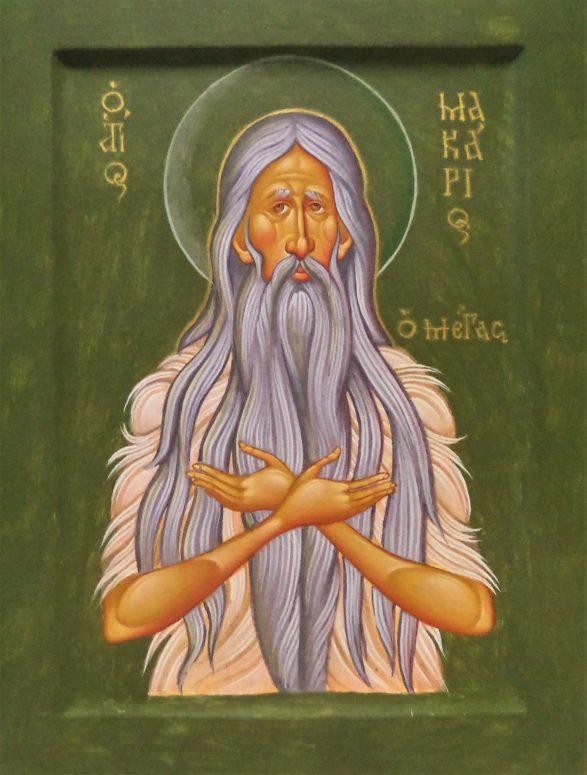
This all begs the question: how can God and sin exist in the same place? How can the baptized Orthodox Christian, cleansed of all sin and having put on Christ, still have dragons, lions, and poisonous beasts dwelling side by side within his heart?
“As we have said, from the instant we are baptized, grace is hidden in the depths of the intellect, concealing its presence even from the perception of the intellect itself. When someone begins, however, to love God with full resolve, then, in a mysterious way, by means of intellectual perception, grace communicates something of its riches to his soul. Then, if he really wants to hold fast to this discovery, he joyfully starts longing to be rid of all his temporal goods, so as to acquire the field in which he has found the hidden treasure of life (Matt 13:44). This is because, when someone rids himself of all worldly riches, he discovers the place where the grace of God is hidden. For as the soul advances, divine grace more and more reveals itself to the intellect.” ~St Diadochos of Photiki, saying #77, Philokalia vol 1
Let’s now overlay what St Diadochos says about the baptized heart, keeping in mind St Macarius’ words as well, with the symbolic rendering of the darkening of the sun at the crucifixion. The baptized Orthodox Christian has truly put on Christ at their baptism. Christ now dwells, mystically, at the center of their heart, which, in turn, is the mystical center of each individual man.
But remember carefully St Paul’s words about what exactly we put on at baptism: Christ’s death. Christ dwells in our hearts, crucified. The darkening of the sun (of light, brilliance, revelation, and knowledge; Luke 23:45) are our sinful thoughts and actions, which like a cloud covering the whole earth and eclipsing the natural sun, cloud our intellection, our mind, from seeing Christ crucified in ourselves. I am deeply reminded of St Ephraim’s symbolic exegesis of the tree of life being hidden behind or within the tree of the knowledge of good and evil.
So purifying our nous, our intellection, and guarding our thoughts (those things that can enter into, or can dwell within, our heart) is not only for seeing outwardly, but also for seeing inwardly, and why the Fathers are so adamant in speaking about this.
For the saying is true, Blessed are the pure in heart, for they shall see God!

